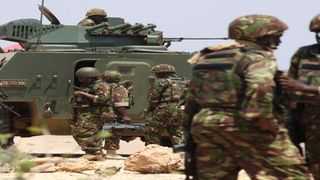
KDF soldiers in Somalia.
| File | nation Media GroupNews
Premium
Gedo attack: KDF cleared of killing civilians in Somalia
The Kenya Defence Forces did not conduct the airstrikes that claimed civilian lives in Gedo region of Somalia in June, the Nation has learnt.
The African Union Mission in Somalia (Amisom) force commander in Mogadishu exonerated KDF from blame in a letter to the Special Representative of the Chairperson of the AU Commission.
A probe conducted included tracking down the movement of KDF helicopters in the period the airstrikes were conducted and assessing its aviation unit’s daily activities.
This ruled out the possibility that Kenyan choppers could have been used in the alleged strikes that reportedly killed two civilians and injured seven others on the region that borders Kenya and Ethiopia.
“Supported by the above correspondences this HQ confirms that no Amisom-KDF helicopters were used in the alleged airstrike,” states the letter.
After the International Court of Justice (ICJ) delivered its judgment on the maritime dispute between Somalia and Kenya, President Mohamed Abdullahi Mohamed ‘Farmaajo’ claimed Nairobi had in the past attempted to frustrate the case by waging a military campaign.
“This campaign included indiscriminate air and land strikes inside Somalia’s borders. A case in point being the death of innocent civilians, including helpless women and children in the town of Belet-Hawo,” Farmaajo claimed.
Amisom Kenya commander in Sector II, Brigadier Jeff Nyagah, said KDF did not have any troops on the ground in Gedo.
He disregarded the claims as smear propaganda aimed at soiling the gains made by Kenyan troops in Somalia.
“We operate jointly with Somali Security Forces; they would have been the first ones to raise the red flag that we were here. There’s no way you will allow another force to kill your people as you watch. That case was fully investigated and we were exonerated,” said Brig. Nyagah.
Amisom headquarters in Mogadishu is able to monitor flights moving within Somali airspace in real time.
“They were able to produce evidence and track our planes’ movements and fueling stations over the period in question. We also have our Air Traffic Control wing here that enables us to track the movement of our planes and this is an independent system from Mogadishu,” said Brig. Nyagah.
The war against Al-Shabaab includes airstrikes on terror cells.
In 2001, a joint resolution by the US Senate and House of Representatives authorised American forces to conduct strikes against organisations or persons determined to have aided the terrorists’ attacks that occurred on September 11, 2001.
US Africa Command (Africom) says Al-Shabaab presents long-term threats to not just the region, but also America. Africom conducted strikes against the militia within the vicinity of Cammaara, Somalia, on August 24 with initial assessment showing that no civilians were affected.
“The federal government of Somalia and US Africa Command forces take great measures to prevent civilian casualties. These efforts contrast with the indiscriminate attacks that al-Shabaab regularly conducts against the civilian population,” stated Africom.





